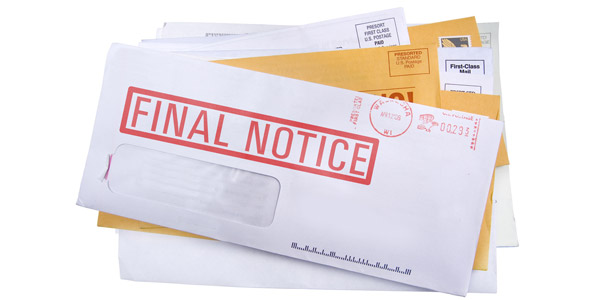Five secrets of debt collection

Creditor calls and letters? Threats of court action or home visits? Welcome to the debt collection process.
Each creditor is different in how they deal with people who are struggling to pay. All creditors have one thing in common though: as businesses they want to recover as much money as they can. And the debt collection process is their way of chasing you to repay what you owe.
Doing your best with your debt
If you’re with StepChange Debt Charity you’re showing your creditors that with our support you’re doing the best you can with your debts. However, you might still get some contact from creditors.
Most creditors are happy to cooperate once they know you’re getting debt advice, and bar the odd automated letter they’ll usually leave you be while you make reduced payments.
However, some creditors will use various techniques to try and get you to pay more money. Some of these you might be concerned by, or even scared of, especially when you don’t know how to deal with debt collectors or even what your creditors can and can’t do about your debt. In this article we want to dispel the myths and explain that creditor action actually isn’t as scary as it sometimes sounds.
The truth about the stages of debt collection
When we talk about these secrets we’re talking about consumer credit debt, such as credit cards, unsecured loans and catalogues. We‘re not talking about secured debt or debts to HMRC or unpaid fines or council tax.
- You’ve been defaulted.
One of the early stages of the debt collection process is that you receive a default notice. A default is registered on your credit file for six years, and yes, this sounds scary! The truth is, if you’re in debt the quicker a creditor issues a default the better it is for you, and the quicker it’ll drop off your credit file (in six years’ time). A default notice is really just an official notice that the agreement with your creditor has been broken.
- Your debt has been passed to a debt collection agency.
Again, this is normal and often just means it’s been passed to another department within the same company and you’re getting letters on a different letterhead. Don’t worry about this. If you’ve been transferred to an outside collection agency, some can be more lenient and easier to deal with than the original creditor.
- Your debt has been passed to solicitors.
This isn’t as scary as it sounds either. Some solicitors are owned by lenders and employ similar tactics to any other debt collector.
- One of our representatives will visit your home.
Unless it’s a doorstep loan, this is very unlikely. It’s often used as a tactic to get you to call the creditor. A doorstep agent has no more powers than someone calling on the phone. They’re not bailiffs and it’s worth watching our video to find out the difference between a debt collector and a bailiff.
- I’m ringing you because you haven’t paid us.
There are rules about how many times a day a creditor can call you, but you can stop them calling completely by requesting it. Read our blogpost about how to stop creditor phone calls.
The debt collection process might feel intimidating, but many of the letters and calls you receive are just part of the standard process businesses go through to recover debts. And they have to abide by rules.
If you’re with StepChange Debt Charity you’ll find that we can support and help you through this. Your creditors will also find that once you’ve spoken to us and put a budget together you’ll have a realistic plan in place to repay or address your debt problem.
Save
Tags bailiffscalls from debt collectorsdebt collection processdebt collector tacticshow to deal with debt collectorsletters from creditorsphone calls
Related Posts
Many of our Facebook followers are moving towards freedom from debt with...
Read more
Want free stuff but don’t know which websites you can trust? MoneyMagpie...
Read more
There’s a great way to keep fashionable and save your pennies at...
Read more

Responses